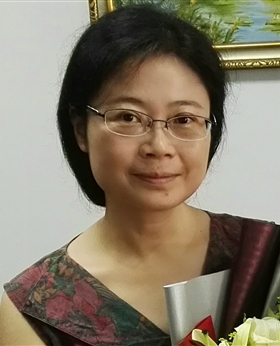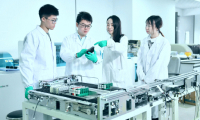
Zheng, Duo(Professor) Professor
Basic Medical School
Professor
Department of Cell Biology and Medical Genetics
BIOGRAPHICAL SKETCH
NAME: Zheng, Duo
POSITION TITLE: Professor of Cancer Biology; Deputy Director, Shenzhen Key Laboratory of Translational Medicine of Tumor; Deputy Director, Cancer Research Center, Shenzhen University
EDUCATION/TRAINING
|
INSTITUTION AND LOCATION |
DEGREE ? |
Completion Date MM/YYYY ? |
FIELD OF STUDY ? |
|---|---|---|---|
|
East China Normal University, Shanghai, China |
B.S. |
07/1990 |
Biological Science |
|
State Key Laboratory of Medical Genetics, Central South University, Changsha, Hunan, China |
M.Sc. |
07/1998 |
Medical Genetics |
|
State Key Laboratory of Medical Genetics, Central South University, Changsha, Hunan, China |
Ph.D. |
07/2001 |
Medical Genetics |
|
Department of Cellular and Molecular Biology, the Hormel Institute, University of Minnesota, USA |
Postdoctoral ? |
12/2009 ? |
Cancer Biology ? |
|
? |
? |
? |
? |
?
A.?? Personal Statement
My long-standing research interests lie in the molecular mechanisms of cancer, anti-cancer drug exploration, and disease-causing gene cloning and functional studies. I served as deputy director of the State Key Laboratory of Medical Genetics of China and the Deputy Dean of the School of Life Sciences, Central South University from 2001 to 2006. I have served as the founding Deputy Director of the Shenzhen Key Laboratory of Translational Medicine of Cancer, Deputy Director of the Shenzhen Synthetic Biology Laboratory, and Deputy Director of the Shenzhen University Cancer Research Center since 2013. My lab is actively exploring the function of CDK3 、 TRPV1 and other genes in tumor development, and in particular, interacting proteins and post-translational modifications (e.g., phosphorylation and ubiquitination). Research in my lab has been continuously supported by the National Natural Science Foundation in China (NSFC) with four regular grants and governments of the Guan g dong Province and Shenzhen City since 2003. I have published >60 papers in professional, peer-reviewed journals. I am currently mentoring three postdoctoral fellow and six MSc candidates.
?
B.?? Positions and Honors
Positions and Employment
07/90 – 08/95??????? Teaching Assistant, XiangYa School of Medicine, Central South University, Changsha, China
09/95 – 02 /01 ??????? Lecturer, State Key Laboratory of Medical Genetics of China, Central South University, Changsha, China
03/01 – 02/04??????? Associate Professor; Deputy Director, State Key Laboratory of Medical Genetics of China, Central South University, Changsha, China
03/04 – 03/06??????? Associate Professor; Deputy Dean, School of Life Science, Central South University, Changsha, China
01/10 – present???? Professor, Shenzhen University School of Medicine, Shenzhen, Guangdong, China
03/13 – present???? Founding Deputy Director, Shenzhen Key Laboratory of Translational Medicine of Cancer,? Shenzhen, Guangdong, China
03/13 – present ???Founding Deputy Director, Cancer Research Center, Shenzhen University , Shenzhen, Guangdong, China
?
C.?? Contributions to Science (*: corresponding/co-corresponding author)
?
a.??? CDK3 in cancer development and anti-cancer drug exploring
?
Cyclin-Dependent Kinase (CDK)-3, a member of the CDK family of kinases, has a critical role in cell cycle regulation and is involved in G0-G1 and G1-S cell cycle transitions. However, the role of Cdk3 in cell proliferation, as well as cell transformation, is not yet clearly understood. In 2008, I, a visiting scholar in Dr. Zigang Dong’s lab, was among the first to characterize that CDK3–mediated activating transcription factor 1 phosphorylation enhances cell transformation (Cancer Research 2008) .We also found that CDK3–mediated c-Jun phosphorylation at Ser63 and Ser73 enhances cell transformation (Cancer Research, 2009). Afterward, my group identified several novel CDK3-associated proteins and their phosphorylation sites. We have also annotated their role in cancer development. According to these data, CDK3-targeted miRNAs and anti-cancer drugs have been searched and studied.
?
b.??? TRPV1 in cancer development
Blockade of the transient receptor potential channel vanilloid subfamily 1 (TRPV1) is a potential therapeutic approach for pain relief. However, TRPV1 is a widely expressed protein whose function might be critical in various non-neuronal physiologic conditions. In 2009, I, a postdoctoral at Dr. Zigang Dong’s lab, was among the first to characterize that TRPV1 suppresses skin carcinogenesis (Cancer Research 2009). We showed that TRPV1 interacts with EGFR (epidermal growth factor receptor), leading to EGFR degradation. Notably, the absence of TRPV1 in mice results in a striking increase in skin carcinogenesis. Afterward, my group has identified the role of TRPV1 in nasopharyngeal carcinoma and liver cancer. We also found EGFR phosphorylates TRPV1, which is involved in cancer development.
??
c.??? Cancer-related Gene function study
1.????? Tian Xiao, Joe Jiang Zhu, Shiying Huang, Cong Peng, Shiping He, Jie Du, Ruisha Hong, Xianxiong Chen, Ann M. Bode, Wenqi Jiang, Zigang Dong, Duo Zheng*. Phosphorylation of NFAT3 by CDK3 induces cell transformation and promotes tumor growth in skin cancer. Oncogene. 2017 May 18;36(20):2835-2845.
2.????? Huang G, Li S, Yang N, Zou Y, Zheng D*, Xiao T*. Recent progress in circular RNAs in human cancers. Cancer Lett. 2017 Sep 28; 404:8-18.
3.????? Ting Cao, Tian Xiao, Guanqun Huang, Yafei Xu, Joe Jiang Zhu, Kaixin Wang,Wencai Ye, Hong Guan*, Jingsong He*, Duo Zheng*. CDK3, target of miR-4469, suppresses breast cancer metastasis via inhibiting Wnt/β-catenin pathway. Oncotarget. 2017 May 25; 8(49):84917-84927.
4.????? He J, Zheng R, Zhang Z, Tan J, Zhou C, Zhang G, Jiang X, Sun Q, Zhou S, Zheng D, Huang Y, Wu L, Lai Z, Li J, Yang N, Lu X, Zhao Y. Collagen I enhances the efficiency and anti-tumor activity of dendritic-tumor fusion cells. Oncoimmunology. 2017 Aug 8; 6(12).
5.????? Tan, Juntao; Yang, Nuo; Zhong, Liping; Tan, Jie; Hu, Zixi; Zhao, Qing; Gong, Wenlin; Zhang, Zhenghua; Zheng, Rong; Lai, Zongqiang; Li, Yanmei; Zhou, Chaofan; Zhang, Guoqing; Zheng, Duo; Zhang, Ying; Wu, Siyu; Jiang, Xinglu; Zhong, Jianhong; Huang, Yong; Zhou, Sufang; Zhao, Yongxiang. A New Theranostic System Based on Endoglin Aptamer Conjugated Fluorescent Silica Nanoparticles. THERANOSTICS, 7(19): 4862-4876, 2017.
6.????? Li, Xia; Zhou, Bo; Zhao, Zilong; Hu, Zixi; Zhou, Sufang; Yang, Nuo; Huang, Yong; Zhang, Zhenghua; Su, Jing; Lan, Dan; Qin, Xue; Meng, Jinyu; Zheng, Duo; He, Jian; Huang, Xianing; Zhao, Jing; Zhang, Zhiyong; Tan, Weihong; Lu, Xiaoling; Zhao, Yongxiang.A Smart Detection System Based on Specific Magnetic and Rolling Cycle Amplification Signal-Amplified Dual-Aptamers to Accurately Monitor Minimal Residual Diseases in Patients with T-ALL. Journal of Biomedical Nanotechnology, 12(12): 2151-2160, 2016
7.????? Rongfei Han, Guanqun Huang, Yejun Wang, Yafei Xu, Yueming Hu, WenqiJiang, Tianfu Wang, Tian Xiao, Duo Zheng*. Increased gene expression noise in human cancers is correlated with low p53 and immune activities as well as late stage cancer. Oncotarget. 2016 Nov 1;7(44):72011-72020
8.????? Wu H, Liu L, Lin M, Liu L, He C, Zheng D*, Huang W*. Importance of the residue 190 on bactericidal activity of the bactericidal/permeability-increasing protein 5. Oncotarget. 2016 Jul 12;7(28):43088-43094. doi: 10.18632/oncotarget.9292.
9.????? Rongfei Han, Shiying Huang, Yonghua Bao,Xin Liu,Xiaoyu Peng,Zhiguo Chen,Qian Wang,Jiaqi Wang,Qiuping Zhang,Tianfu Wang,Duo Zheng*, Wancai Yang*.? Upregulation of SOX4 antagonizes cellular senescence in esophageal squamous cell carcinoma. Oncology Letters. 2016 Aug;12(2):1367-1372. Epub 2016 Jun 29.
10.?? Xiaojing Zhang, Yin Peng, Zhe Jin,*, Weiling Huang, Yulan Cheng, Yudan Liu, Xianling Feng, Mengting Yang, Yong Huang, Zhenfu Zhao, Liang Wang, Yanjie Wei, Xinmin Fan, Duo Zheng*, Stephen J. Meltzer.? Integrated miRNA profiling and bioinformatics analyses reveal potential causative miRNAs in gastric adenocarcinoma. Oncotarget. 2015 Oct 20;6(32):32878-89.
11.?? Zhu Jiang, He Shiping, Du Jie, Wang Zhulin, Li Wang, Chen Xianxiong, Jiang Wenqi, Zheng Duo*, Jin Guangyi; Local administration of a novel TLR7 agonist in combination with doxorubicin induces durable tumoricidal effects in a murine model of T cell lymphoma. Journal of Hematology & Oncology. ?2015 Mar 4;8(1):21.
12.?? Zhang J, Chen T, Mao Q, Lin J, Jia J, Li S, Xiong W, Lin Y, Liu Z, Liu X, Zhao H, Wang G, Zheng D*, Qiu S*, Ge J*. PDGFR-β-activated ACK1-AKT Signaling Promotes Glioma Tumorigenesis. Int J Cancer. ?2015 Apr 15;136(8):1769-80.
13.? Kaowen Yan, Li Li, Xiaojian Wang, Ruisha Hong, Ying Zhang, Hua Yang, Ming Lin,Sha Zhang, Qihua He, Duo Zheng, Jun Tang, Yuxin Yin, Genze Shao. The deubiquitinating enzyme complex BRISC is required for proper mitotic spindle assembly in mammalian cells. Journal of Cell Biology. 2015 Jul 20;210(2):209-24.
14.?? B Zhu, K Yan, L Li, M Lin, S Zhang, Q He, D Zheng, H Yang and G Shao. K63-linked ubiquitination of FANCG is required for its association with the Rap80-BRCA1 complex to modulate homologous recombination repair of DNA interstand crosslinks. Oncogene. 2015 May 28;34(22):2867-78.?
15.?? Wang L, Hu HY, Lin YL, Zhao ZX, Tan L, Yu P, Wan HJ, Jin Z*, Zheng D*. CDK3 Expression and Its Clinical Significance in Human Nasopharyngeal Carcinoma. Mol Med Rep. 2014 Jun;9(6):2582-6
16.? Lau AT, Lee SY, Xu YM, Zheng D, Cho YY, Zhu F, Kim HG, Li SQ, Zhang Z, Bode AM, Dong Z. Phosphorylation of histone H2B serine 32 is linked to cell transformation. J Biol Chem. 2011 Jul 29;286(30):26628-37.
17.? Zhu F, Zykova TA, Peng C, Zhang J, Cho YY, Zheng D, Yao K, Ma WY, Lau AT, Bode AM, Dong Z. Phosphorylation of H2AX at Ser139 and a new phosphorylation site Ser16 by RSK2 decreases H2AX ubiquitination and inhibits cell transformation. Cancer Res. 2011 Jan 15;71(2):393-403.
18.? Xu YM, Zhu F, Cho YY, Carper A, Peng C, Zheng D, Yao K, Lau AT, Zykova TA, Kim HG, Bode AM, Dong Z. Extracellular signal-regulated kinase 8-mediated c-Jun phosphorylation increases tumorigenesis of human colon cancer. Cancer Research. 2010 Apr 15;70(8):3218-27.
19.? Wen W, Zhu F, Zhang J, Keum YS, Zykova T, Yao K, Peng C, Zheng D, Cho YY, Ma WY, Bode AM, Dong Z. MST1 promotes apoptosis through phosphorylation of histone H2AX. J Biol Chem. 2010 Dec 10; 285(50):39108-16.
20.? Cho YY, Tang F, Yao K, Lu C, Zhu F, Zheng D, Pugliese A, Bode AM, Dong Z*. Cdk3-Mediated c-Jun Phosphorylation at Ser63/73 Enhances Cell Transformation. Cancer Research. 2009 Jan 1;69(1):272-81.
21.? Malakhova M, Kurinov I, Liu K, Zheng D, D'Angelo I, Shim JH, Steinman V, Bode AM, Dong Z. Structural diversity of the active N-terminal kinase domain of p90 ribosomal S6 kinase 2. PloS One. 2009 Nov 30;4(11):e8044.
22.?? Bode AM, Cho YY, Zheng D (co-first author), Zhu F, Ericson ME, Ma WY, Yao K, Dong Z. Transient receptor potential type vanilloid 1 suppresses skin carcinogenesis. Cancer Research . 2009 Feb 1;69(3):905-13
23.?? Zheng D, Cho YY, Lau AT, Zhang J, Ma WY, Bode AM, Dong Z. Cdk3-Mediated ATF1 Phosphorylation Enhances Cell Transformation. Cancer Research. 2008 September 15;68(18):1-11.
24.?? Zheng D, Bode AM, Zhao Q, Cho YY, Zhu F, Ma WY, Dong Z. The cannabinoid receptors are required for ultraviolet-induced inflammation and skin cancer development. Cancer Research. ?2008 May 15;68(10):3992-8.
25.? Zheng D*, Li T, Liu X, Hu W, Chen H, Yang Y. A novel MSH2 mutation in a Chinese family with hereditary non-polyposis colorectal cancer. International journal of colorectal disease. 2007 Aug; 22(8):875-879.
26.? Cho YY, Yao K, Kim HG, Kang BS, Zheng D, Bode AM, Dong Z. Ribosomal s6 kinase 2 is a key regulator in tumor promoter induced cell transformation. Cancer Research. 2007 Sep 1;67(17):8104-12
27.? Li M, He Z, Ermakova S, Zheng D, Tang F, Cho YY, Zhu F, Ma WY, Sham Y, Rogozin EA, Bode AM, Cao Y, Dong Z. Direct inhibition of insulin-like growth factor-I receptor kinase activity by (-)-epigallocatechin-3-gallate regulates cell transformation. Cancer Epidemiol Biomarkers Prev. 2007 Mar; 16(3):598-605.
?
d.??? Research Support
Ongoing Research Support
NSFC (China) project (81372149)???????? ?????? ????? ????????????????????01/01/2014 to 12/31/2017
Duo Zheng, PI ????????????????????????????????????????????? ????????????? ????????????????????¥700,000
The molecular mechanism and function of EGFR/TRPV1 signaling axis
?
National Science Foundation Projects
of Guangdong Province (2014A030313547)????????????? ??????????????????? 10/01/2015 to 07/30/2017
Duo Zheng, PI????????????????????????????????? ? ????????????? ??????????????????????????¥100,000
The function of EGFR induced TRPV1 phosphorylation on membrane channel
?
High level Talents Project of Guangdong Province
?(2013)????????? ?????? ????????????????????????????????????????????????????????????????????????? 01/01/2014 to 12/31/2016
Duo Zheng, PI ????????????????????????????????????????????? ????????????? ?????????????????????¥250,000
Functional characterization of TRPV1 in tumor development
?
Scientific Research Foundation from Shenzhen Municipal ??????06/22/2016 to 06/30/2019
Government of China (JCYJ20160427105140594)??????????? ??????¥3,000,000
Duo Zheng, PI
The function and mechanism study on MicroRNA targeting cell cycle regulating proteins
?
Scientific Research Foundation for Shenzhen
overseas high level talent (KQCX20140519104925300)????????? ??? 01 /01/2015 to 12/31/2016
Duo Zheng, PI ????????????????????????????????????????????? ????????????? ?????????????????????¥600,000
CDK3 network and the correlation of tumor
?
Scientific Research Foundation from Shenzhen Municipal
Government of China (JCYJ20140418193546118)?????????? ???????01 /01/2015 to 12/31/2016
Duo Zheng, PI ????????????????????????????????????????????? ????????????? ?????????????????????¥300,000
Functional characterization of BRCA1 involved in DNA damage response and tumor suppression
?








用户登录
还没有账号?
立即注册